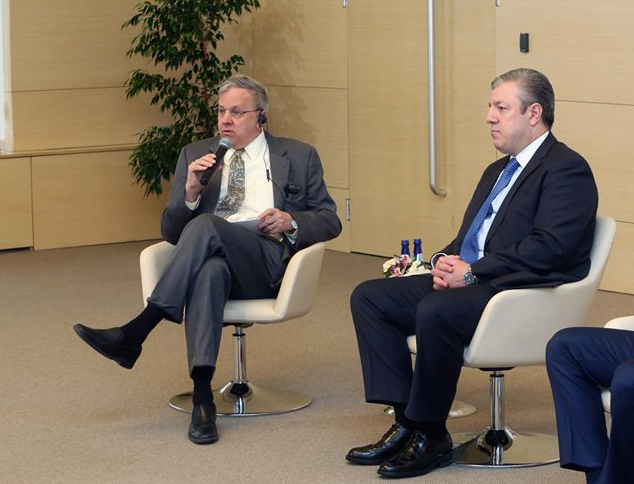
US Ambassador Urges Georgia to Better Communicate its Pro-Western Agenda
Publication: Eurasia Daily Monitor Volume: 15 Issue: 28
By:

On February 20, the US Ambassador to Georgia, Ian Kelly, took part in the opening of the Strategic Communication Training program for Georgian public servants. This program aims to boost the communication skills of government employees in Georgia, both on the national and regional levels. The training is financially supported by the US Embassy and is implemented by the Georgian Center for Security and Development (GSCD).
The Prime Minister of Georgia, Georgi Kvirikashvili, attended the presentation of the program. He stated that good strategic communication skills of public servants are essential in modern day conditions when Russia and other countries use various forms of “hybrid war“ (Agenda.ge, February 20).
Over the past 25 years, the US has funded many programs in Georgia to develop civil society and democratic institutions. But the start of the Strategic Communication Training program attracted public attention, especially with the speech of the American ambassador. Ian Kelly indirectly reproached the Georgian government for not always successfully conveying to the public its pro-Western agenda: “Georgia should develop a strategic plan for communications both inside the country and abroad. It is in our interests, that you are coming closer to the West, and eventually joining NATO and the EU. But this requires the support of Georgian society,” the ambassador said. He urged the government to “formulate clear messages, so that the people understand why its interests correspond to integration into the Western and not the Northern community” (Agenda.ge, February 20).
In reference to the “Northern community,” the US diplomat clearly meant the “integration associations” initiated by Russia, such as the Eurasian Economic Union and the Collective Security Treaty Organization (CSTO). Ambassador Kelly noted that the clarity of the messages is very important, so that the people understand their meanings. He stressed that government institutions must act on the principle of “one team, one mission, a single message.” “This is important, since it is you who must determine the clear narrative for your country,” the US ambassador said. He warned of what can happen if the Georgian authorities and elites fail in formulating such messages: “I can guarantee that if you are not finding the narrative, somebody else up north will find it for you or finance and empower the actors within Georgian society that define a different narrative that is not in your interest,” said the Ambassador. (Interpressnews, February 20).
Ian Kelly’s statement sparked substantial interest in Georgia. Most experts believe that the ambassador expressed Washington’s concern over the strengthening of the pro-Russian lobby in Georgia and also the unclear signals coming from the Georgian government. “The ruling party ‘Georgian Dream’ and the government of Georgi Kvirikashvili announced the invariability of the pro-Western course of joining NATO and the EU. But at the same time, refused to join Western sanctions against Moscow after the annexation of the Crimea,” according to David Avalishvili, an expert of the information and analytical agency GHN. He said that Tbilisi is in constant dialogue with the Russian leadership about abolishing the visa regime for Georgian citizens, and some MPs from the “Georgian Dream” party have made inaccurate statements about the policy of the EU and the United States (Author’s interview on February 22).
Against the backdrop of Russia’s intervention in Ukraine, its annexation of Crimea and the international community’s weak reaction, supporters of Georgia’s integration into the Eurasian Economic Union—a political-economic project dominated by Moscow and championed by Russian President Vladimir Putin—have begun raising their voices (EDM, April 3, 2014).
Encouraging neutrality for Georgia has become a key refrain of the country’s various pro-Russian organizations, particularly as Moscow has ramped up the use of its “soft power” to advance Russian interests in the Caucasus (see EDM, April 2, 2014). The sources of funding for such pro-Russian activities are, therefore, important to explore. (EDM, October 8, 2015)
Political scientist George Nodia said that the US ambassador had in mind not only foreign policy, but also dangerous trends threatening Georgian democracy: “The case of Azerbaijani journalist Afgan Mukhtarly, who was kidnapped from Tbilisi on May 29, 2017, has not yet been investigated. The Azerbaijani court sentenced him to six years imprisonment,” Nodia reminded (Author’s interview, February 22). He also believed, that Turkish opposition leader Emre Chabuk is seriously threatened with deportation to Turkey. Georgia refused to grant him political asylum. “Some MPs from the ruling party do not hide their sympathy for nationalist organizations, such as the ‘Georgian March,’ which propagates xenophobia, homophobia and anti-Western sentiments,” Nodia said. (Authors interview, February 22).
According to military scholar Vakhtang Maisaia, Ambassador Kelly’s statement is an example of America’s “signal diplomacy.” “The Americans often warn their partners, if some aspects of their policy cause doubt in Washington. In this case, the issues are not only the attitude of the Georgian authorities to Russia, but also the rapprochement with China in the trade and economic sphere and some aspects of Georgian-Iranian relations,” Maisaia underlined (Authors Interview, February 22).
Prime Minister Giorgi Kvirikashvili repeatedly confirmed the invariability of Georgia’s foreign policy for priority cooperation with the Euro-Atlantic community, as well as the government’s loyalty to the ideals of democracy and the protection of human rights. Georgia actively participates in the Afghan operation of NATO and the United States, signed an association agreement with the EU and still refuses to restore diplomatic relations with Russia following the Russia-Georgia war in August 2008. However, the signals given by Ambassador Kelly will require additional and more precise answers from the government of Kvirikashvili.



